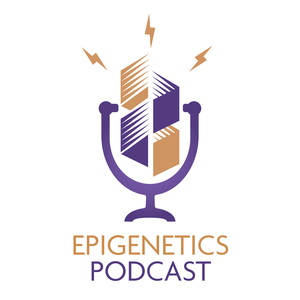Epigenetic Regulation and Small Molecule Innovation in AML: Advances in Translational Leukemia Research (Ani Deshpande)
In this episode of the Epigenetics Podcast, we talked with Ani Deshpande from Sanford Burnham Prebys about his work on epigenetic regulation and developing small molecules through high throughput screens for AML.
Throughout our discussion, we delve into Dr. Despande's journey into the field of biology and science, tracing his evolution from a literature enthusiast in Mumbai to a dedicated cancer researcher. He reflects on his formative experiences during his PhD at Ludwig Maximilian University in Munich, where she developed murine models for refractory acute myeloid leukemia (AML). We examine these models' contributions to therapeutic discovery and understanding the intricate mechanisms underscoring AML's complexities.
Transitioning to his postdoctoral work at Scott Armstrong's lab in Boston, Dr. Despande shares his insights on the importance of epigenetic regulators, such as DOT1L, in leukemias, and how they can serve as strategic therapeutic targets. His ambitious pursuit of translational research is further highlighted through his efforts in developing a conditional knockout mouse model and his collaborative work utilizing CRISPR technology to refine our understanding of epigenetic regulation in cancer pathogenesis.
Moreover, we engage in a conversation about the challenges and opportunities that arise when establishing his lab at Sanford Burnham Prebys. Dr. Despande candidly discusses the delicate balance between pursuing topics of genuine interest versus adhering to grant fundability, underlining the tension researchers face in the current scientific landscape. His emphasis on the critical need for innovation within lab settings serves as a motivational call for emerging scientists to venture beyond the established templates that often inhibit groundbreaking discoveries.
We conclude our dialogue with an exploration of his recent projects, which involve targeting specific epigenetic modifiers and how his lab’s findings can contribute to greater understanding and potential treatments for not only AML but also other pediatric cancers driven by gene fusions. Dr. Despande's insights into the integration of modern technologies, such as CRISPR libraries, exemplify his commitment to pushing the boundaries of cancer research.
In addition to discussing his scientific contributions, we touch upon Dr. Despande's foray into podcasting (The Discovery Dialogues), shedding light on his motivation to bridge the communication gap between scientists and the broader public. He articulates his desire to demystify scientific discoveries and promote awareness about the intricate journey of research that lays the groundwork for medical advancements. This multidimensional discussion not only highlights his scientific achievements but also emphasizes the importance of effective science communication in fostering public understanding and appreciation of research.
References
Deshpande AJ, Cusan M, Rawat VP, Reuter H, Krause A, Pott C, Quintanilla-Martinez L, Kakadia P, Kuchenbauer F, Ahmed F, Delabesse E, Hahn M, Lichter P, Kneba M, Hiddemann W, Macintyre E, Mecucci C, Ludwig WD, Humphries RK, Bohlander SK, Feuring-Buske M, Buske C. Acute myeloid leukemia is propagated by a leukemic stem cell with lymphoid characteristics in a mouse model of CALM/AF10-positive leukemia. Cancer Cell. 2006 Nov;10(5):363-74. doi: 10.1016/j.ccr.2006.08.023. PMID: 17097559.
Deshpande AJ, Deshpande A, Sinha AU, Chen L, Chang J, Cihan A, Fazio M, Chen CW, Zhu N, Koche R, Dzhekieva L, Ibáñez G, Dias S, Banka D, Krivtsov A, Luo M, Roeder RG, Bradner JE, Bernt KM, Armstrong SA. AF10 regulates progressive H3K79 methylation and HOX gene expression in diverse AML subtypes. Cancer Cell. 2014 Dec 8;26(6):896-908. doi: 10.1016/j.ccell.2014.10.009. Epub 2014 Nov 20. PMID: 25464900; PMCID: PMC4291116.
Sinha S, Barbosa K, Cheng K, Leiserson MDM, Jain P, Deshpande A, Wilson DM 3rd, Ryan BM, Luo J, Ronai ZA, Lee JS, Deshpande AJ, Ruppin E. A systematic genome-wide mapping of oncogenic mutation selection during CRISPR-Cas9 genome editing. Nat Commun. 2021 Nov 11;12(1):6512. doi: 10.1038/s41467-021-26788-6. Erratum in: Nat Commun. 2022 May 16;13(1):2828. doi: 10.1038/s41467-022-30475-5. PMID: 34764240; PMCID: PMC8586238.
Related Episodes
Targeting COMPASS to Cure Childhood Leukemia (Ali Shilatifard)
The Menin-MLL Complex and Small Molecule Inhibitors (Yadira Soto-Feliciano)
MLL Proteins in Mixed-Lineage Leukemia (Yali Dou)
Contact
Epigenetics Podcast on Mastodon
Epigenetics Podcast on Bluesky
Dr. Stefan Dillinger on LinkedIn
Active Motif on LinkedIn
Active Motif on Bluesky
Email:
[email protected]
